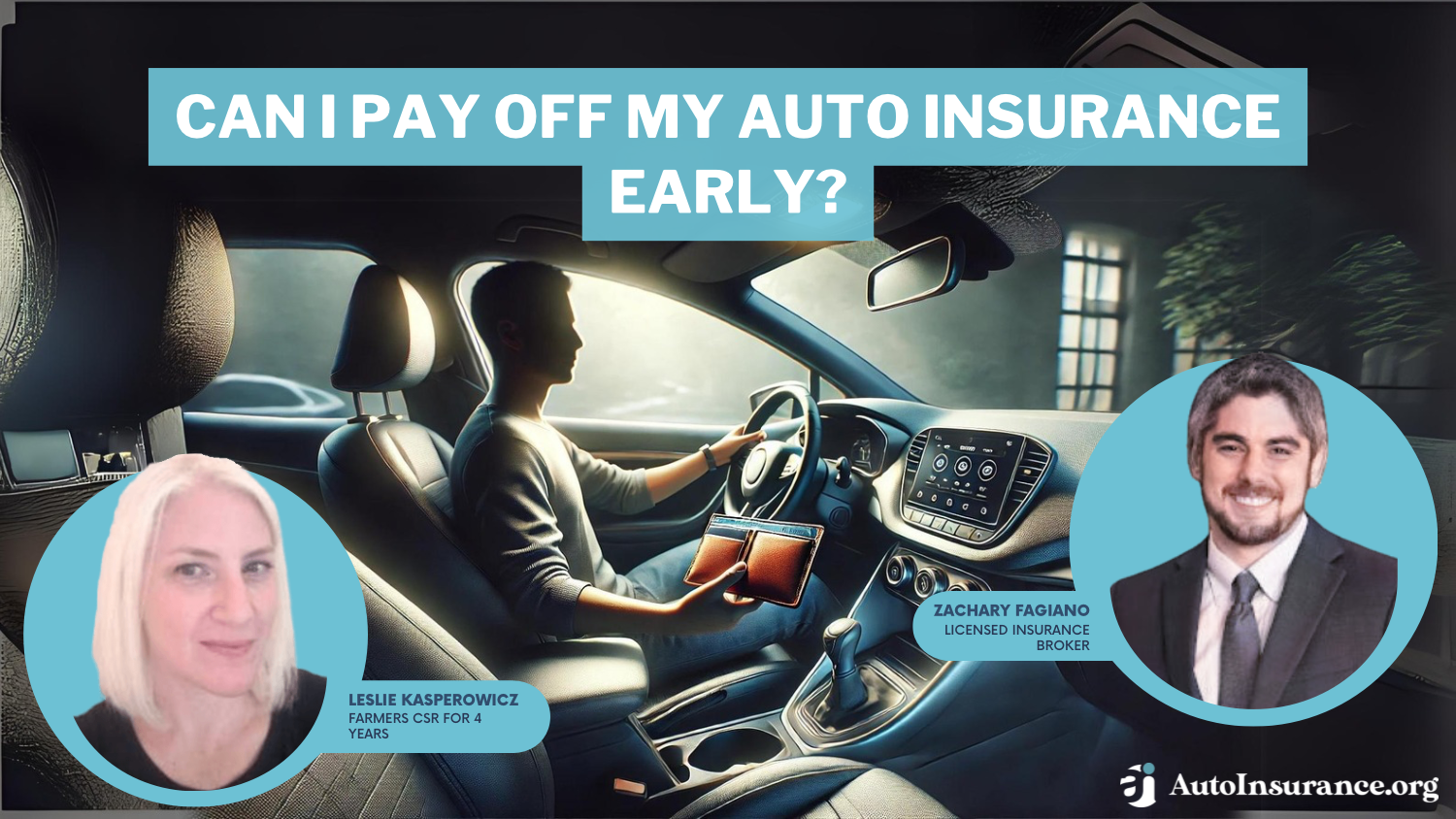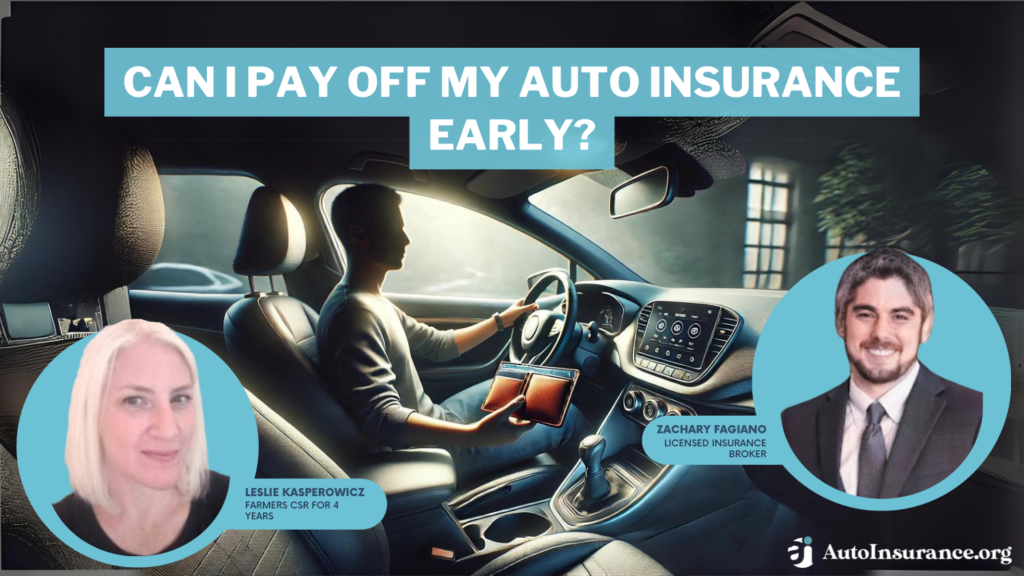Can I pay off my auto insurance early?
Are you wondering: Can I pay off my car insurance early? All insurance companies have their own rules. Some companies prefer to do business with clients who will pay their policy in full. This saves the insurer money because operations don't have to be focused on accounts receivables.

Free Car Insurance Comparison
Compare Quotes From Top Companies and Save
Secured with SHA-256 Encryption
Zach Fagiano
Licensed Insurance Broker
Zach Fagiano has been in the insurance industry for over 10 years, specializing in property and casualty and risk management consulting. He started out specializing in small businesses and moved up to large commercial real estate risks. During that time, he acquired property & casualty, life & health, and surplus lines brokers licenses. He’s now the Senior Vice President overseeing globa...
Licensed Insurance Broker
UPDATED: Dec 26, 2024
It’s all about you. We want to help you make the right coverage choices.
Advertiser Disclosure: We strive to help you make confident auto insurance decisions. Comparison shopping should be easy. We are not affiliated with any one auto insurance provider and cannot guarantee quotes from any single provider. Our partnerships don’t influence our content. Our opinions are our own. To compare quotes from many different companies please enter your ZIP code on this page to use the free quote tool. The more quotes you compare, the more chances to save.
Editorial Guidelines: We are a free online resource for anyone interested in learning more about auto insurance. Our goal is to be an objective, third-party resource for everything auto insurance related. We update our site regularly, and all content is reviewed by auto insurance experts.
UPDATED: Dec 26, 2024
It’s all about you. We want to help you make the right coverage choices.
Advertiser Disclosure: We strive to help you make confident auto insurance decisions. Comparison shopping should be easy. We are not affiliated with any one auto insurance provider and cannot guarantee quotes from any single provider. Our partnerships don’t influence our content. Our opinions are our own. To compare quotes from many different companies please enter your ZIP code on this page to use the free quote tool. The more quotes you compare, the more chances to save.
On This Page
When you apply for insurance, you’re agreeing to pay your premiums in exchange for financial protection after you have a covered loss. If you don’t pay the premiums, the insurer you’re doing business with isn’t obligated to pay out your benefits.

That’s why it’s best that you pay as much as you can early on so that you don’t miss a payment.
Many people aren’t in a financial situation where they can pay their full policy premium all at once. Fortunately, there are payment options that will work for most customers.
If you can’t pay a six-month premium, paying a monthly installment might be a better option. Then, if your financial situation changes, you have the option to pay off the balance on your account early.
If you are looking for better auto insurance rates, start comparison shopping today by entering your ZIP code above!
- Your car insurance premiums will be billed either once every six months or once every year
- You have the choice to pay the policy in full or to set up payment arrangements so you can pay installments
- If you’re paying in monthly installments, you can pay more than what’s due but must pay at least the minimum
- If you have extra money to pay off some of your bills, you do have the option to pay off the balance of your policy
- Early payments can be made by managing your car insurance policy through a company’s app or website
- You can’t pay for insurance coverage past the end of your current term if the upcoming renewal hasn’t been run yet
Do You Have to Pay Your Policy in Full When You Apply for Insurance
All insurance companies have their own rules. Some carriers prefer to do business with clients who will pay their policy in full.
Paying in full saves the insurer money to collect premiums all at once because operations don’t have to be focused on accounts receivables. When clients pay their premiums upfront, they’re also unlikely to cancel before the term is up.
Just because full payments benefit the carrier doesn’t mean that’s all the average carrier will accept. Only allowing clients to pay in full would limit the company’s client base.
Auto insurance carriers will provide payment installment plans, with some carriers advocating for their customers to take advantage of the pay-in-full auto insurance discount by paying the entire premium upfront.
Additionally, when considering whether you have to pay your policy in full when you apply for insurance, it’s essential to understand the flexibility offered by most insurance companies. One option is the car insurance installment plan, which allows you to make monthly payments rather than paying a lump sum upfront.
While this plan can make budgeting easier, some people might wonder, “Can you pay off your monthly car insurance early?” The answer is often yes; many insurers allow you to pay off your installments ahead of time. Paying off your car insurance early can provide peace of mind, ensuring you are covered without worrying about future payments.
Another consideration is deciding between paying your auto insurance in full vs monthly. Prepaying your auto insurance in one lump sum can often result in a discount, making it the best way to pay car insurance for those who can afford it. This method eliminates the need to remember monthly payments and potentially saves money in the long run.
However, not everyone has the financial flexibility to make a large upfront payment. Therefore, evaluating your financial situation and choosing the option that best suits your needs is crucial.
Furthermore, all insurance companies have their own rules, and some carriers prefer to do business with clients who will pay their car insurance policy is paid in full. Paying in full saves the insurer money as they collect premiums all at once, reducing the need for extensive accounts receivables operations.
When clients pay their car insurance premium upfront, they’re also less likely to cancel before the term ends. However, only allowing clients to pay in full would limit the company’s client base, so most insurers offer flexible payment options.
Free Auto Insurance Comparison
Enter your ZIP code below to view companies that have cheap auto insurance rates.
Secured with SHA-256 Encryption
What are Auto Insurance Premium Installments
There are a few different payment plan options that you can select if you’re not in a position to pay your first bill off all at once. In the industry, it’s standard for companies to allow their customers to pay:
- Monthly
- Quarterly
- Semiannually
If you pay premiums in monthly installments, the total premium will be divided into either six or 12 equal amounts.
Some carriers will collect more upfront and then divide the remaining amount into the remaining installments. If you pay quarterly, there will be four equal installments due every three months.
Moreover, when managing auto insurance premium installments, flexibility and convenience are key considerations. One common question is, “Can you pay off your car insurance early?” The answer is yes; many insurance companies allow customers to settle their remaining balance ahead of schedule, which can provide peace of mind and potentially save money on interest or fees.
Additionally, renewing insurance with installment payments can make it easier for policyholders to manage their finances by spreading the cost over several months instead of paying a lump sum upfront.
Different payment methods also offer convenience. For instance, paying your auto insurance by phone is a quick and easy option for those who prefer not to pay online. However, it’s important to be aware of the consequences of paying your auto insurance late, as this can lead to penalties, higher premiums, or even cancellation of the policy.
Some insurers also offer the option of paying your auto insurance in four payments, providing a middle ground between monthly installments and a full upfront payment. Understanding these options allows policyholders to choose the best method for their financial situation and ensure continuous coverage.
Can You pay the Policy off Early if You Have an Installment Plan set up

If you select an installment plan, you’ll need to organize your finances so that you can submit your payments by the due date.
Knowing the due date is crucial. If there’s no grace period, your policy will cancel if you’re just one day late submitting your payment.
Sometimes, when you work overtime and you save money elsewhere on a bill, you might have more money in your pocket to cover your recurring bills. To relieve yourself of the burden of paying all of the installments on time, you can pay off the balance of your policy.
Check your last invoice and look at the premium balance instead of looking at the current amount due so that you can submit your payment.
Also, when managing an auto insurance policy, understanding payment options is crucial. If you’re wondering whether you can pay the policy off early if you have an installment plan set up, it’s important to check with your insurer. For example, Root auto insurance customer service can provide detailed information about whether you can settle your remaining balance before the end of the term.
Some insurance companies, including Root, may allow you to pay off the policy early, which could offer benefits such as reducing overall interest or simplifying your payment schedule. Additionally, if you are interested in Root auto insurance coverage for a one-time payment, this option may be available and can often result in savings compared to installment plans.
Moreover, if you prefer to handle payments over the phone, paying for your Root auto insurance by phone is a convenient option that many customers find useful. It’s also important to ensure that any changes to your payment plan, including paying off the policy early, are managed correctly to avoid issues with coverage or billing.
If this vehicle is paid off, it might affect your insurance policy terms, so discussing these details with customer service can ensure your policy remains in good standing.
Can You pay for Coverage Past the Expiration Date on Your ID Cards
Your auto insurance ID cards or your declarations page will show you when the current policy expires.
When you make a payment to pay off the balance of your current term, you’ll have coverage until the expiration. You can’t pay past the expiration date on your documents because the new term could have a new rate.
Subsequently, when managing your auto insurance, it’s important to understand how payments affect your coverage. If you’re considering paying for coverage past the expiration date on your ID cards, it’s essential to know that you can only make payments up to the expiration of your current policy.
For instance, the insurance payment made towards your current insurance policy payment will ensure you have coverage until the policy expires. You can’t pay past the expiration date on your documents because the new term might come with a new rate, which could affect your credit for paying off auto insurance premiums early.
Additionally, if you are planning to pay off your remaining balance early, it is crucial to consider the implications for your coverage. The remaining balance on my car insurance will be settled, but it won’t extend coverage beyond the expiration date. To avoid a car insurance lapse, you must renew your policy in time.
Moreover, understanding your options for monthly car insurance payments or other payment methods will help manage your budget effectively while ensuring there is no gap in your coverage. If you are concerned about a potential grace period for auto insurance, checking with your insurer about their policies can provide clarity and prevent any interruptions in coverage.
Free Auto Insurance Comparison
Enter your ZIP code below to view companies that have cheap auto insurance rates.
Secured with SHA-256 Encryption
Can You pay Your Policy off Early if the Renewal has Run

A renewal is run when a policy is about to expire. As the term nears an end, the carrier will start to process the upcoming renewal.
A renewal happens about 30 days before the next term will begin. The insurer will run reports, check your claims records, and decide if you qualify for coverage still. You’ll receive a new renewal bill in the mail afterward.
You can’t pay off your insurance early until the renewal has been run.
If the renewal has been run and you have gotten the paperwork in the mail, you can pay off the current balance and the upcoming invoice all at once. You will then have paid the carrier until the end of your next term which will last for either six months or 12 months.
You can pay your insurance with:
- Cash
- Credit
- Check
Make sure that you keep track of your due dates so that you aren’t stuck without any coverage on the open road.
If you’re tired of making regular payments each month, pay off your insurance. If you don’t want to stay with your current insurer, start getting quotes online and see if you can afford to pay a new insurance policy in full.
If you don’t want to stay with your current insurer, start getting quotes online and see if you can afford to pay a new insurance policy in full.
Also, when evaluating whether you can pay your policy off early if the renewal has run, it’s important to understand how different factors can influence your decision. For instance, getting auto insurance quotes can provide insights into your current premium and how it might change with an early payoff.
If you’re interested in Geico auto insurance, knowing the Geico’s full coverage auto insurance price per month is essential for budgeting and understanding the potential impact on your payments. With a Geico auto insurance monthly payment plan, you might find options that allow flexibility, but you should confirm whether paying off the policy early affects your current rate or future premiums.
Additionally, while you may consider paying off your policy early, it’s also worth noting the potential disadvantages of paying off a car loan early. This action might impact your overall financial strategy, including how you manage your Geico auto insurance coverage.
It’s crucial to weigh these factors carefully and consult with your insurer to determine how an early payoff might affect your coverage and costs. Understanding these elements can help you make informed decisions about managing your insurance payments effectively.
also, when considering whether you can pay your policy off early if the renewal has run, it’s important to consider how this decision affects your overall insurance costs. For those seeking affordable car insurance, paying off your policy early might help manage your budget more effectively by avoiding future payments.
If you’re aiming for reasonable car insurance, understanding how early payment impacts your renewal can ensure you maintain the best rates. Additionally, if you own a vehicle outright, exploring auto insurance for paid off cars might help reduce your coverage costs. Ultimately, finding the best car insurance involves balancing these factors to get the most value for your money.
Try our FREE online quote tool to compare auto insurance rates! Enter your ZIP code below to get started!
Frequently Asked Questions
Can I pay off my auto insurance policy before it expires?
Yes, in most cases, you can pay off your auto insurance policy before it expires. It is possible to make an early payment to settle the remaining premium for the policy term.
Why would I want to pay off my auto insurance early?
There are several reasons why you might want to pay off your auto insurance early. Some common reasons include:
- Financial savings: By paying off your policy early, you may be able to save on interest charges or installment fees that may apply if you pay monthly.
- Simplifying finances: Some individuals prefer to make a lump-sum payment to avoid monthly billing and maintain better control over their finances.
- Cancellation flexibility: Paying off your policy early can give you more flexibility in canceling or switching insurance providers without the need to wait for the current policy term to end.
Are there any penalties or fees for paying off my auto insurance early?
It is essential to review your insurance policy or contact your insurance provider directly to determine if there are any penalties or fees associated with early payment. Some insurance companies may charge a small fee for canceling a policy early, while others may not have any penalties at all.
How do I pay off my auto insurance early?
To pay off your auto insurance policy early, you typically need to contact your insurance provider directly. They will guide you through the process and provide instructions on making a lump-sum payment to settle the remaining premium.
Will paying off my auto insurance early result in a refund?
Whether you receive a refund for paying off your auto insurance early depends on the insurance company’s policies and the terms of your specific policy. Some insurance providers may refund the unused portion of the premium, while others may not offer refunds. It is best to inquire with your insurance provider directly to understand their refund policy.
Can I adjust my coverage or make changes to my policy when paying off my auto insurance early?
Paying off your auto insurance early does not typically affect your ability to make changes to your policy or adjust your coverage. You can still contact your insurance provider to discuss any modifications you would like to make.
Is it better to go through insurance or pay out of pocket?
Choosing between going through insurance or paying out of pocket depends on your financial situation and the specifics of the claim. Going through insurance is often preferable for significant damages or repairs, as it can help cover costs that might be difficult to afford out of pocket. However, paying out of pocket might be advantageous if the damage is minor and you want to avoid potential increases in your insurance premiums.
Is it better to pay car insurance in full or monthly?
Whether it’s better to pay car insurance in full or monthly depends on your financial situation. Paying in full often results in a discount and avoids the hassle of monthly payments. On the other hand, paying monthly can make it easier to budget and manage cash flow, though it might come with a slight increase in overall cost due to added fees or interest.
What does it mean when your car insurance policy is paid in full?
When your car insurance policy is paid in full, it means you have settled the entire premium for the policy term upfront. This often results in a discount compared to paying monthly installments and ensures you won’t have to worry about making payments throughout the policy period.
What does prorated insurance mean?
Prorated insurance refers to the adjustment of your insurance premium based on the portion of the coverage period that has been used. For instance, if you cancel your policy mid-term, you might receive a prorated refund for the unused portion of the premium.
What does remaining balance refer to in a State Farm policy?
The remaining balance in a State Farm policy refers to the amount of premium that is still owed on your policy. This balance can be relevant if you have chosen a payment plan and need to settle any outstanding amounts to maintain coverage or before making changes to your policy.
What are the consequences of not paying your car insurance on time?
Not paying your car insurance on time can lead to several consequences, including late fees, a lapse in coverage, and potential cancellation of your policy. This lapse can affect your ability to file claims and may result in higher premiums or difficulties in obtaining coverage in the future.
What happens when you pay off your insurance premium?
When you pay off your insurance premium, you have settled the full amount due for your policy term. This typically means you won’t have to make further payments until the next renewal period, and you may also benefit from avoiding additional fees or interest associated with installment plans.
When do car insurance rates typically go down?
Car insurance rates often go down after periods of consistent, claim-free driving, as insurers view you as a lower risk. Additionally, rates may decrease when you reach certain milestones such as renewing your policy or after the initial policy term if you’ve demonstrated safe driving habits.
When will my car insurance rates go down after an accident?
Your car insurance rates might go down after an accident once the accident is no longer recent or if you maintain a clean driving record following the incident. Typically, the impact of an accident on your rates diminishes over time, especially if you don’t have further claims or violations.
Why do I have a remaining balance on my car insurance?
You might have a remaining balance on your car insurance due to partial payments or adjustments in your premium. This balance could result from changes in your coverage, late payments, or a difference between what was paid and what is owed for the policy term.
Why do I need to make a down payment for car insurance?
A down payment for car insurance is often required to secure coverage and is typically a percentage of the total premium. It helps insurers cover the initial risk and ensures that the policyholder is financially committed to maintaining coverage.
Should I keep full coverage on my paid-off car?
Whether to keep full coverage on a paid-off car depends on your individual needs and financial situation. Full coverage provides protection against a wider range of risks, including theft and comprehensive damage, which may be beneficial if you want to maintain extensive protection.
Is it better to pay car insurance monthly or every 6 months?
Deciding whether to pay car insurance monthly or every 6 months depends on your budget and preferences. Paying every 6 months often results in a discount and fewer administrative hassles, while monthly payments can offer better cash flow management but may incur additional fees.
Is car insurance cheaper if you lease a vehicle compared to financing it?
Car insurance may be cheaper if you lease a vehicle compared to financing it, as leased vehicles often have lower coverage requirements. However, the cost difference can vary based on the terms of the lease, the vehicle’s value, and your insurance provider’s policies.
Is car insurance more expensive if you have a loan on the vehicle?
Yes, car insurance can be more expensive if you have a loan on the vehicle. Lenders often require full coverage to protect their investment, which typically includes higher coverage limits and comprehensive and collision coverage, leading to higher insurance premiums.
Free Auto Insurance Comparison
Enter your ZIP code below to view companies that have cheap auto insurance rates.
Secured with SHA-256 Encryption
Zach Fagiano
Licensed Insurance Broker
Zach Fagiano has been in the insurance industry for over 10 years, specializing in property and casualty and risk management consulting. He started out specializing in small businesses and moved up to large commercial real estate risks. During that time, he acquired property & casualty, life & health, and surplus lines brokers licenses. He’s now the Senior Vice President overseeing globa...
Licensed Insurance Broker
Editorial Guidelines: We are a free online resource for anyone interested in learning more about auto insurance. Our goal is to be an objective, third-party resource for everything auto insurance related. We update our site regularly, and all content is reviewed by auto insurance experts.
